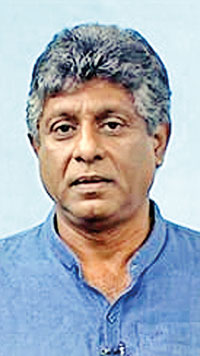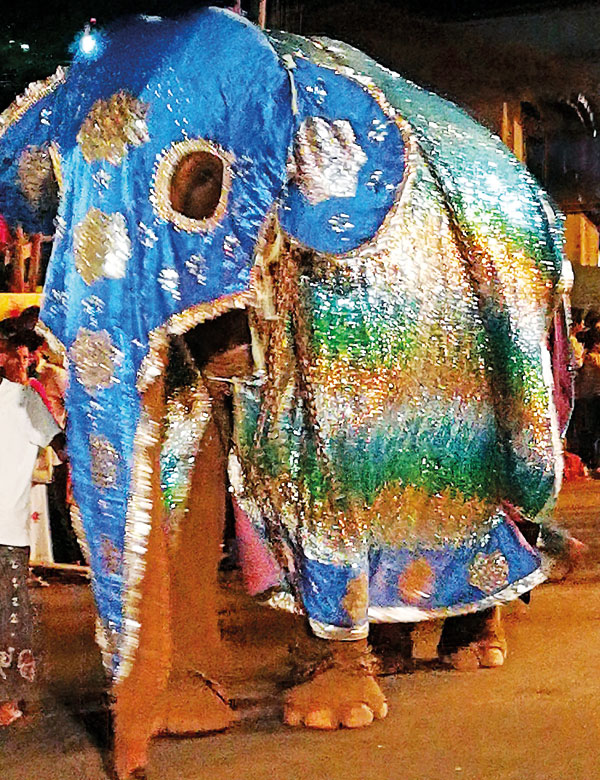News
Sri Lanka to state its case on elephants in processions
View(s):By Kasun Warakapitiya
A renowned veterinarian, and professor in veterinary clinical science at the University of Peradeniya Professor Asoka Dangolla is to fly to Thailand to defend the use of elephants in perahera.
This comes as international pressure is mounting against the use of elephants in processions, following the repatriation of the ailing, wounded tusker Muthu Raja (Sak Surin) that had been gifted to
Sri Lanka.

Panchali Panapitiya
According to Thai sources, a few groups in Thailand are trying to raise awareness in Thailand against using elephants in peraheras in Sri Lanka. Even though the campaigns are not official, the groups continue their work despite the lack of public interest.
Professor Dangolla who is part of a
Sri Lankan delegation to a three-day national elephant convention is due to speak on culture, heritage as well as the history of captive elephants in Sri Lanka.
The convention aims to address the welfare of Thai elephants that have been gifted to other countries.
“It is perfectly fine that Thai people are concerned about their elephants. We have a long history, and culture of keeping elephants under captive conditions and have unique ways of taking care of elephants,’’ he said.
He said Sri Lanka does not need to be taught how to take care of elephants and their welfare. But, Sri Lanka needs the exchange of knowledge of training elephant keepers, new methods of training elephants and advanced methods of treating elephants.
He said he too is against the harassment of elephants and is doing research on their welfare. Prof Dangolla told the Sunday Times that he would clarify the methods Sri Lankans use to handle elephants in a non-intrusive manner and cultural and historical practices.
Some will say that the elephant is suffering, while others can say the heat is not a factor at night. However, neither the government authorities, nor researchers have studied whether the ornamental coverings on elephants cause any suffering,he said, referring to caparisoned elephants in peraheras.

Professor Asoka Dangolla
The delegation to Thailand will include another professor of the University of Peradeniya, Prof Anil Pushpakumara, and the director of Animal Health and Nutrition at Dehiwela Zoo, Dr. Chandana Rajapaksa.
Pradeep Nilanga Dela, Diyawadana Nilame of the Maligawa, in Kandy, told the Sunday Times that as a Buddhist country Sri Lanka continues the tradition of using elephants in peraheras.
He said even during British Colonisation Sri Lanka maintained its culture and identity and elephants were used in peraheras. Referring to the country’s main pageant, the Esala Perahera, he said it is a national event, which also attracts tourists.
Mr. Dela said the Muthu Raja incident, (the repatriation of the tusker gifted to Sri Lanka by Thailand following injuries and wounds) created a lot of unnecessary interference and pressure against Sri Lanka.
Some have hidden agendas such as reducing the number of tourists to
Sri Lanka by blacklisting peraheras.
He said local non-governmental organisations too support some foreign agendas.
According to the Constitution the government is bound to protect the religion and culture of the country. Leaders should look into the welfare of elephants while maintaining a strong position against foreign pressures imposed on culture,he said.
Apart from Kaveri Raja who is injured, all the tuskers of the ‘Eth Panthiya’ (elephantsused in the Esala perahera) are in good health. including Indi Raja, Buruma Raja and other tuskers.
An elephant owner S.M Roshan alias ‘Ali Roshan’ explained that despite environmentalists’ call for the use of Pinnawala elephants in peraheras, it was impractical.
He said elephants used in peraheras are trained from a young age. The animals are trained to remain calm amidst dancing and drumming.
The five Pinnawala elephants join only the dewala perhera and there have been incidents where those elephants have became agitated.
Mr. Roshan said that the government and those who organise processions need to take a stand against anyone who degrades the country’s culture and tries to distort traditional practices.

A caparisoned elephant : All set to take part in a perahera. Pix by Nilan Maligaspe
Sri Lanka’s Rally for Animal rights and Environment (RARE) Director Panchali Panapitiya who is following the progress of tusker Muthu Raja (Sak Surin) after its repatriation to Thailand said: “Muthu Raja is doing very well. He’s under the best veterinary care in Asia. He was in musth. And unlike when it was in Sri Lanka where all of its legs were tied during musth, only one long chain is used. It doesn’t show any aggression towards his caretakers or vets. This shows that he is healing mentally too. His wounds have healed. He is also walking much better. His gait has improved,” she said. The Thai Elephant Conservation Centre in Lampang (where Muthu Raja is being treated) is Government operated. Here each bull elephant is tied using one chain and they are taken for daily walks with a mahout.
“I am not supportive of elephants being in captivity. My view is that elephants should only be in the forest and only for injury or illness should they be in captivity, but that too, in a human monitored and maintained forest-like sanctuary. Not in chains or zoos,” she said.
According to her, there is no plan by the Thai Government to take back Thai Raja or Kandula.
However, there is a growing concern among Thais who are eager to see that Thai Raja is retired. There are also Thai activists calling for repatriation of both elephants.
“My opinion is that not only Thai Raja but no elephant should be made to work beyond 50 years. There has to be a retirement plan and they should be retired to a sanctuary,” Ms. Panapitiya said.
“Personally, I am against taking elephants in peraheras. It’s animal cruelty. However, to increase the welfare of elephants, the number of peraheras that have traditionally taken elephants for the past 100 years must be identified. They are the only peraheras that should be allowed elephants.’’
She added that she is unaware of the Thai Government’s effort to stop elephants taking part in peraheras. Thailand has a large captive elephant industry and uses such elephants for cultural activities.
However, The Sunday Times watched live videos of Muthu Raja on the social media page of Thai Elephant Conservation Centre. Even though the tusker’s abscesses had recovered, its gait had not completely improved.
It was tethered by a chain around its front leg and was fed grass, and given water from a small container. A mahout keeps adding grass. The tusker does not have a water tank to bathe from. Earlier, videos show a hose being used.
The best way to say that you found the home of your dreams is by finding it on Hitad.lk. We have listings for apartments for sale or rent in Sri Lanka, no matter what locale you're looking for! Whether you live in Colombo, Galle, Kandy, Matara, Jaffna and more - we've got them all!

